|
|
|
Sort Order |
|
|
|
Items / Page
|
|
|
|
|
|
|
| Srl | Item |
| 1 |
ID:
112621
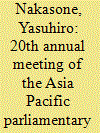

|
|
|
| 2 |
ID:
112622
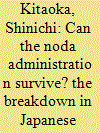

|
|
|
| 3 |
ID:
112627
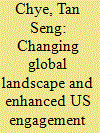

|
|
|
|
|
| Publication |
2012.
|
| Summary/Abstract |
United States President Barack Obama's announcement of significant shifts in US polices towards the Middle East and East Asia in 2009 has affected the global strategic landscape. President Obama's announcement of enhanced US engagement with Asia has posed certain challenges to the prevailing regional architecture of ASEAN centric institutions and ASEAN centrality which has fostered peace and stability, and prosperity in the region. The rise of China and its growing political and economic influence in the region and its military modernisation have aroused US concern that a rising China could in the future challenge its primacy in the Asia region. President Obama's announcement of a web of military alliances of treaty allies and strategic partners with the stationing of US marines in Darwin in November 2011 was perceived by China as an attempt by the US to contain China or constrain its rise. ASEAN is uneasy about any emergence of big power rivalry in the region.
|
|
|
|
|
|
|
|
|
|
|
|
|
|
|
|
| 4 |
ID:
112626
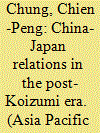

|
|
|
|
|
| Publication |
2012.
|
| Summary/Abstract |
The tenure of Japanese Prime Minister Junichiro Koizumi (2001-2006) was vexing for China-Japan relations. As such, the five years since Koizumi left office, particularly the change in Japan's ruling party, were initially expected, and sometimes perceived, to realize a half-decade of recovery and reconciliation in Sino-Japanese ties. While tensions did decrease, "icebergs" blocking improvement in relations have not completely thawed, and may harden again. Competition for political and economic influences and interests in the same region, concern over one another's future security posture and relations with Taiwan, territorial disputes, misunderstanding about the other's historical sensitivities and feelings of distrust, occasionally manipulated by nationalists, still pervade the relationship. Therefore, though there is mutual desire, indeed a necessity, for cooperation on many issues affecting both countries, this typically couples with a disconcerting or anxious feeling towards the other's intentions that results in competitiveness. There are deep roots to this need/fear complex.
|
|
|
|
|
|
|
|
|
|
|
|
|
|
|
|
| 5 |
ID:
112624
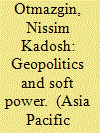

|
|
|
|
|
| Publication |
2012.
|
| Summary/Abstract |
Japan's cultural policy and cultural diplomacy in Asia has changed dramatically over the past one hundred years, from actively introducing and imposing Japanese culture during its empire-building period, to essentially avoiding the promotion of Japanese culture in Asia for most of the postwar period due to fears of being seen once again as engaged in cultural imperialism, and more recently, to supporting and encouraging the export of Japanese contemporary culture and lifestyle in order to attain "soft power." Looking at the fluctuations in Japan's cultural policy over these three periods allows us to understand how Japan has used cultural policy to further its geopolitical goals and more basically how it has viewed the role of "culture" in the context of its relations with Asian neighbors. In a broader sense, the Japanese experience shows that cultural policy, even when inward-looking, is not isolated from a country's geopolitical position and its ambitions in the world, regardless of the political system under which it operates.
|
|
|
|
|
|
|
|
|
|
|
|
|
|
|
|
| 6 |
ID:
112623
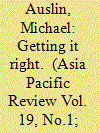

|
|
|
|
|
| Publication |
2012.
|
| Summary/Abstract |
This paper explores the opportunities presented by the Trans-Pacific Partnership (TPP) to Japan to revitalize its trade policy, bolster economic growth, and increase participation in regional multilateral fora for the 21st century. Despite its strengths, Japan has continued to face problems caused by its economic, political, and strategic policies. The Japanese economy has been stagnant for the last several decades, and Japan needs to take bold steps to ameliorate this situation. Politically, domestic political paralysis has had a negative impact on Japan's alliances and partnerships and eroded Tokyo's ability to act as a major player in the increasing vital and important Indo-Pacific region. Connected to this, it is imperative for Japan to engage itself deeply in Asia in ways that increase strategic trust. This paper will also highlight the necessary reforms Japan must undertake to take full advantage of the benefits of the TPP, as well as what the TPP might mean for its relationship with both the US and other regional partners.
|
|
|
|
|
|
|
|
|
|
|
|
|
|
|
|
| 7 |
ID:
112628
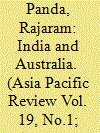

|
|
|
|
|
| Publication |
2012.
|
| Summary/Abstract |
India and Australia are rediscovering the vast potentials of maximizing mutual benefits that are inherent in their complementary economies. There is also a great deal of convergence of interests in the strategic domain. As an emerging power, India's profile has attracted attention by countries in the Asia Pacific region, which tended to neglect it in the past. The rise of China and its assertive stances have created an element of uneasiness in the region. Its military modernization and beefing up of naval capability are suspected to be behind enhancing its power projection capability.
The strategic significance of the Indian Ocean for the region is huge. The region's growth is inextricably linked to the Indian Ocean. The littoral states in the region are home to 2.6 billion people, almost 40% of the world's population. The Indian Ocean is the world's third largest body of water, and the world's leading energy and trade seaway. The volume of global trade brings with it the re-emerging problems of terrorism and piracy, a shared policing challenge for all littoral states. The security of the Indian Ocean goes to the heart of both India's and Australia's national interests.
|
|
|
|
|
|
|
|
|
|
|
|
|
|
|
|
| 8 |
ID:
112625


|
|
|
|
|
| Publication |
2012.
|
| Summary/Abstract |
Japan's economic diplomacy has evolved significantly since the 1990s in response to the reconfiguration of regional and global power. This article places developments along a conceptual continuum and finds that, slowly but steadily, Japanese policies shift from an emphasis on commercial goals of economic diplomacy to include also a more outspoken element of power play. While tourism promotion may be considered a new part of economic diplomacy, long-time practices of trade and investment promotion, business advocacy, and development cooperation are revamped with a focus on the environmental and energy fields. The negotiation of trade agreements, which for long was highjacked by domestic politics, was given new impetus in 2010, while financial diplomacy-which seemed promising in the early 2000s-stalled. Finally, negative sanctioning is no longer a taboo, particularly in the relationship with North Korea. The appetite of the government and private sector to conform with Western countries remains limited, however, and the ambiguity between the old and the new suggests that we are witnessing a change in Japanese tactics rather than in strategy.
|
|
|
|
|
|
|
|
|
|
|
|
|
|
|
|
|
|
|
|
|